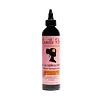What's inside
What's inside
 Key Ingredients
Key Ingredients

 Benefits
Benefits

 Concerns
Concerns

 Ingredients Side-by-side
Ingredients Side-by-side

Emblica Officinalis Fruit Extract
Skin ConditioningSesamum Indicum Seed Oil
EmollientCocos Nucifera Oil
MaskingSimmondsia Chinensis Seed Oil
EmollientOlea Europaea Fruit Oil
MaskingMacadamia Ternifolia Seed Oil
EmollientButyrospermum Parkii Butter
Skin ConditioningTheobroma Cacao Seed Butter
EmollientHoney
HumectantBiotin
AntiseborrhoeicDimethyl Sulfone
SolventAhnfeltia Concinna Extract
Skin ConditioningSapindus Mukorossi Fruit Powder
Bacopa Monnieri Extract
Skin ConditioningEclipta Prostrata Extract
Skin ConditioningMelaleuca Alternifolia Leaf Oil
AntioxidantBehentrimonium Methosulfate
Emblica Officinalis Fruit Extract, Sesamum Indicum Seed Oil, Cocos Nucifera Oil, Simmondsia Chinensis Seed Oil, Olea Europaea Fruit Oil, Macadamia Ternifolia Seed Oil, Butyrospermum Parkii Butter, Theobroma Cacao Seed Butter, Honey, Biotin, Dimethyl Sulfone, Ahnfeltia Concinna Extract, Sapindus Mukorossi Fruit Powder, Bacopa Monnieri Extract, Eclipta Prostrata Extract, Melaleuca Alternifolia Leaf Oil, Behentrimonium Methosulfate
Vitis Vinifera Seed Oil
EmollientGlycine Soja Oil
EmollientPrunus Amygdalus Dulcis Oil
Skin ConditioningRicinus Communis Seed Oil
MaskingSimmondsia Chinensis Seed Oil
EmollientMentha Piperita Oil
MaskingRosmarinus Officinalis Leaf Oil
MaskingEucalyptus Globulus Leaf Oil
PerfumingMenthol
MaskingMelaleuca Alternifolia Leaf Oil
AntioxidantRosmarinus Officinalis Leaf Extract
AntimicrobialHelianthus Annuus Seed Oil
EmollientLavandula Angustifolia Oil
MaskingTriticum Vulgare Germ Oil
EmollientCocos Nucifera Oil
MaskingCarthamus Tinctorius Seed Oil
MaskingAloe Barbadensis Leaf Extract
EmollientOenothera Biennis Oil
EmollientOryza Sativa Bran Oil
EmollientTocopheryl Acetate
AntioxidantBenzyl Nicotinate
Skin ConditioningBiotin
AntiseborrhoeicPogostemon Cablin Leaf Oil
MaskingOcimum Americanum Leaf Oil
MaskingSalvia Officinalis Oil
MaskingApium Graveolens Extract
Skin ConditioningEquisetum Arvense Extract
AstringentArctium Lappa Root Extract
Skin ConditioningUrtica Dioica Extract
AstringentSilica
AbrasiveGlycerin
HumectantAscorbic Acid
AntioxidantCholecalciferol
Vitis Vinifera Seed Oil, Glycine Soja Oil, Prunus Amygdalus Dulcis Oil, Ricinus Communis Seed Oil, Simmondsia Chinensis Seed Oil, Mentha Piperita Oil, Rosmarinus Officinalis Leaf Oil, Eucalyptus Globulus Leaf Oil, Menthol, Melaleuca Alternifolia Leaf Oil, Rosmarinus Officinalis Leaf Extract, Helianthus Annuus Seed Oil, Lavandula Angustifolia Oil, Triticum Vulgare Germ Oil, Cocos Nucifera Oil, Carthamus Tinctorius Seed Oil, Aloe Barbadensis Leaf Extract, Oenothera Biennis Oil, Oryza Sativa Bran Oil, Tocopheryl Acetate, Benzyl Nicotinate, Biotin, Pogostemon Cablin Leaf Oil, Ocimum Americanum Leaf Oil, Salvia Officinalis Oil, Apium Graveolens Extract, Equisetum Arvense Extract, Arctium Lappa Root Extract, Urtica Dioica Extract, Silica, Glycerin, Ascorbic Acid, Cholecalciferol
Alternatives
Ingredients Explained
These ingredients are found in both products.
Ingredients higher up in an ingredient list are typically present in a larger amount.
Biotin is a B vitamin that is naturally produced by our bodies. It is also called Vitamin H.
Our bodies use biotin in the metabolism process. It also helps our bodies use enzymes and move nutrients around. A biotin deficiency can lead to brittle hair and nails.
More research is needed on applying biotin topically. However, taking biotin orally has been shown to help nourish the skin, hair, and nails. They play a role in forming skin-hydrating fatty acids.
Biotin is water-soluble. It can be found in foods such as fish, eggs, dairy, nuts, and meat. Vitamin H stands for "haar" and "haut". These are the German words for hair and skin.
Learn more about BiotinCocos Nucifera Oil is obtained from the kernels of the coconut fruit. In other words, this is coconut oil.
Coconut Oil is rich in fatty acids with lauric acid making up the majority of these. It also contains linoleic acid. Due to this high fatty acid content, coconut oil helps trap moisture and soften skin.
Despite being antibacterial, coconut oil may not be great for acne-prone skin. It is comedogenic and may clog pores. This ingredient may not be safe for malassezia or fungal acne.
Note: Coconut Oil should not replace your sunscreen for UV protection. Studies show it only blocks about 20% of UV.
This oil is non-volatile and has a light scent.
The term 'fragrance' is not regulated in many countries. In many cases, it is up to the brand to define this term. For instance, many brands choose to label themselves as "fragrance-free" because they are not using synthetic fragrances. However, their products may still contain ingredients such as essential oils that are considered a fragrance.
Learn more about Cocos Nucifera OilThis tea tree oil comes from the leaves of the Tea Tree plant. Tea tree oil has antioxidant, anti-inflammatory, and antimicrobial properties.
According to the book Journal of Profiles of Drug Substances, tea tree helps in reducing acne-causing bacteria such as Propionibacterium acnes. This is due to the Terpinen components of tea tree oil.
Tea tree may cause sensitivity and irritation for some people. This oil naturally contains fragrance such as linalool and limonene.
However, research shows irritation usually occurs when using pure tea tree oil and not in cosmetic products.
Tea tree oil was found to help relieve the symptoms of psoriasis in one study.
Tea tree oil is toxic when ingested. Another study showed it to caused damage to the nervous system of dogs and cats when applied to their skin or given orally.
Learn more about Melaleuca Alternifolia Leaf OilThis oil comes from the seeds of the desert shrub called Jojoba. It is more commonly known as jojoba oil, a non-comedogenic oil.
Jojoba oil does not contain fragrance and has many fatty-acids, making it a great soothing ingredient.
It also contains Vitamin E, a great moisturizing ingredient. Vitamin E is also an antioxidant and protects your skin against oxidative damage.
This ingredient humectant properties, meaning it helps draw moisture from the air. This helps keep your skin hydrated.
While jojoba has antibacterial properties, it is only able to kill some strains of bacteria.
Studies also show it helps in wound healing. In fact, Indigenous cultures have used jojoba as a moisturizer and to help treat burns for centuries.
Fun fact: Jojoba oil similar to natural human skin sebum, so it has a great effect on dry skin. It is also promising with helping to regulate sebum production.
Due to its fatty acid content, Jojoba oil may not be fungal acne safe. We recommend speaking with a professional if you have any concerns.
Learn more about Simmondsia Chinensis Seed Oil